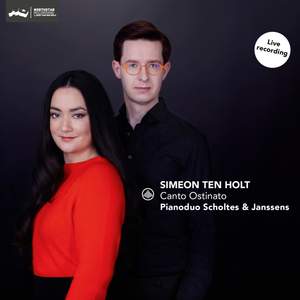The second disc on Challenge Classics by duo Scholtes-Janssens presents one of the milestones of the European minimalism: Canto Ostinato by Simeon ten Holt.
Canto Ostinato was premiered in 1979. It is a piece that creates has several themes and implications: a different form of concert; a social process arising from the freedom that the players have to decide on the number of repetitions; the question of and time and space.
In 1963, the composer wrote in his diary that he had it in mind that a concert should be an ongoing performance, with visitors wandering in and out at will. Ten Holt was also fascinated by social processes during these highly formative years. He became interested in time and space. This theme manifested itself in a piece for four keyboards, at the time still entitled Perpetuum. He embarked on this on 19 January 1973. Perpetuum was completed in 1976 but was revised in the period 1976-79 and was then renamed Canto Ostinato. During rehearsals for the premiere, in April 1979, all of the themes that had been occupying Ten Holt seemed to coalesce: small elements that together made up a larger whole; a different form of concert; social processes arising from the freedom that the players had to decide on the number of repetitions; and time and space. Ten Holt never consciously went searching for this form, but when Canto Ostinato began to conquer the musical world it became clear that his solitary quest had drawn something universal from the mists, something that many listeners and musicians would recognise.





